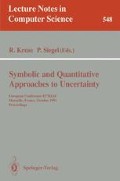Abstract
Our aim is here to give some indications about the basis of a logic system in order to generalize the possibility theory in the following way:
We want that each sentence receive a couple of confidence values. We call them degrees of obligation and eventuality, in order to translate the notion of truth by the half-sum of these values, and a notion that we can see as the imprecision given to this truth value: the diference eventuality — obligation which we shall call the unknown rather than uncertainty.
In relation to the possibility theory, we whish to leave the general property max(ps(P), ps(−P))=1 and then leave:
The aim of this extension is sitted in the tentation of modelising the degrees of truth and unknown, and their propagation when inferences, in the computing system about approximate reasoning.
We would like that linguistics appreciations with vagueness such “perhaps true”, “probably false”, “true always three times on four”, “often true but very uncertain” etc..., could receive those two degrees in order to determinate an interval whose the widness would be the measure of the imprecision given to the truth degree, and it is this that we call unknown.
Preview
Unable to display preview. Download preview PDF.
References
D.Dubois H.Prade Théorie des possibilités Masson 1985
L.Gacôgne Contribution à la représentation des connaissances floues et mise en oeuvre d'un système de raisonnement approché. Thèse Paris VII 1990
B.R. Gaines Foundations of fuzzy reasoning. International Journal Man Machine nℴ8 p. 623–668 1976
G.Klir T.Folger Fuzzy sets, uncertainty and applications. Prentice Hall 1988
R.Martin-Clouaire H.Prade On the problems of representation and propagation of uncertainty in expert system. International Journal Man Machine studies 1984
T.Martin J.Baldwin An abstract mechanism for handling uncertainty. Third international conference IPMU Paris 1990.
L.A. Zadeh Fuzzy sets as a basis for a theory of possibility FSS nℴ1 p. 3 1978
Author information
Authors and Affiliations
Editor information
Rights and permissions
Copyright information
© 1991 Springer-Verlag Berlin Heidelberg
About this paper
Cite this paper
Gacôgne, L. (1991). An extension of the possibility theory in view of the formalization of approximate reasoning. In: Kruse, R., Siegel, P. (eds) Symbolic and Quantitative Approaches to Uncertainty. ECSQARU 1991. Lecture Notes in Computer Science, vol 548. Springer, Berlin, Heidelberg. https://doi.org/10.1007/3-540-54659-6_86
Download citation
DOI: https://doi.org/10.1007/3-540-54659-6_86
Published:
Publisher Name: Springer, Berlin, Heidelberg
Print ISBN: 978-3-540-54659-7
Online ISBN: 978-3-540-46426-6
eBook Packages: Springer Book Archive

